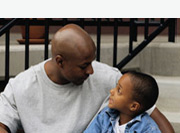To inquire about our services, contact Dr. Bill Morgan at 610.644.8182
Paoli Psychological Associates
43 Leopard Road, Suite 200
Paoli Executive Green 2
Paoli, PA 19301
USA
610.644.8182
Specializing in the assessment and treatment of ADD/ADHD in children and adults
- Counseling
- Testing and Assessment
- ADD/ADHD Coaching
- Career Counseling
- Consultations
Ten Tips for Parents
- Provide a structured environment.
ADD/ADHD children function better in a structured, scheduled, predictable environment. Is your home somewhat hectic and chaotic? If so, the unpredictability and lack of structure and routines may be adding to the difficulties of your ADD/ADHD child. To increase structure, develop daily schedules and routines, predictable rules and consequences, more supervision, more organization, etc. - Create incentive.
Incentive makes a big difference in behavior. Incentive exists when the task at hand is more interesting or fun, or there is a predictable and meaningful reward or consequence. ADD/ADHD children need to know it's worth their effort to behave appropriately. - Action, not words.
ADD/ADHD children misbehave most often not because they don't know what is right, but because they have a performance problem. Lectures, nagging, and tirades are not helpful. Children learn best from the consequences of their behavior. Use immediate consequences — rewards for good behavior, penalties for misbehavior. Don't delay. - Set up for success.
Before tackling a problem, it sometimes helps if we can take a step back and look at what may be contributing to the problem. We can then work on changing those things first. Here are some ideas to consider: rearrange the environment/develop consistent routines/make sure your commands and requests are clear, polite, and understood/treat each other with care, respect, and love/teach new skills/clarify rules and expectations/be consistent with limit-setting and discipline. - Positives before negatives.
A good relationship with your child, one that emphasizes the positives of the child and your appreciation of good behaviors, is important if discipline methods are to be effective and self-esteem is to be maintained. Catch your child doing something right. Be fast and liberal with praise. Make sure your child receives large doses of positive attention on a consistent basis. Provide meaningful rewards for good behavior. Focus on strengths. Increase positive interactions. - Be careful what behaviors you allow to succeed.
Be careful not to reinforce misbehavior by giving too much attention, giving the desired payoff, backing down or arguing in a power struggle, etc. Parents often inadvertently reinforce misbehavior (whining, temper tantrums, defiance, sulking, etc.). Identify the payoff maintaining a repetitive misbehavior, and withhold it. - Become skilled in delivering appropriate consequences for your child's behavior.
Pay attention to your child's behavior-good and bad-and follow-up with appropriate consequences. Children learn behavior and are motivated by the outcomes and results of their behavior. For good behavior, make sure it is recognized and rewarded immediately-specific praise, tangible rewards, positive attention, special privileges. For bad behavior - ignore unimportant misbehavior, set limits on more significant misbehavior and follow through consistently with negative consequences. Determine in advance what consequences are appropriate and make the punishment fit the crime. Make sure the rules are clear beforehand. - “Stop, think, make a plan.”
Promote good problem-solving skills and help your child reduce impulsive behavior by coaching your child to catch himself, slow down, and think, “What will happen if…” in key situations. Teach and prompt your child to think before acting using three steps: 1) “STOP” — catch yourself; 2) “THINK” — about possible actions and potential consequences; 3) “MAKE A PLAN” — to best deal with the situation. Parents can help their children learn to problem solve by prompting and reinforcing the use of this strategy. - Anticipate problems and have a plan.
ADD/ADHD children often repeat the same problems in similar situations over and over again. You can anticipate what settings may be difficult. Prepare and have a plan for these situations. As you enter an anticipated situation, follow these steps: 1) review the rules; 2) set up a reward for appropriate behavior (incentives), 3) set up a penalty for disobeying the rules; 4) give positive attention for good behavior; 5) follow through with consequences. - Change unhelpful thinking.
Many children with ADD/ADHD become negative thinkers over time due to the accumulated negative experiences they have. Self-esteem can suffer. Help your child to identify their own negative thoughts, and counter the unhelpful thinking with helpful thinking. Ask: “Why did you think that?” and “How do you feel when you think that?” Then help your child to think of more helpful thoughts to replace the unhelpful ones. Try to model realistic, positive thinking. Learning how to cope with mistakes and failures is important for ADHD children. Emphasize that making a mistake does not mean that he is stupid or bad.













